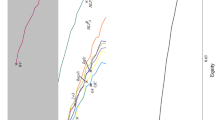Abstract
This article suggests three empirical settings to analyze the effects of an extension of democratic voting rights as suggested by Bruno Frey (Homo Oeconomicus 34(1):1–9, 2017). I argue that some of Bruno Frey’s proposals can be analyzed with available observational data from different countries. Empirical evidence from the suggested settings may complement the theoretical debate on a democracy of the future.
Similar content being viewed by others
Notes
The empirical settings I suggest are not restricted to Switzerland, although it provides a vast number of suitable testing grounds to investigate the effects of direct democracy and the interaction between direct and representative democracy (see, e.g., Stadelmann and Torgler 2017).
Note that this is not precisely what Bruno Frey had in mind when suggesting that non-nationals could have a voting weight of e.g. 20%. However, full voting rights at the local level can be seen as comparable to giving a certain voting weight for all decisions at all levels. From a practical perspective, it might even be desirable to give voting rights to non-nationals at the local level first, and with a further delay at the state and the national level.
Bavaria is a particularly interesting case in Germany, as it has seen numerous popular initiatives and referendum decisions at the state level since 1946. Most notably, local direct democratic instruments have been introduced through a referendum at the state level in 1995, i.e. citizens themselves extended their voting rights (see Arnold et al. 2016).
References
Arnold, F., Freier, R., Pallauf, M., & Stadelmann, D. (2016). Voting for direct democratic participation: Evidence from an initiative election. International Tax and Public Finance, 23(4), 716–740.
Frey, B. S. (1994). Direct democracy: Politico-economic lessons from Swiss experience. American Economic Review, 84(2), 338–342.
Frey, B. S. (2017). Proposals for a democracy of the future. Homo Oeconomicus, 34(1), 1–9.
Hessami, Z. (2016). How do voters react to complex choices in a direct democracy? Evidence from Switzerland. Kyklos, 69(2), 263–293.
Kauder, B., & Potrafke, N. (2016). Supermajorities and political rent extraction. Kyklos, 69(1), 65–81.
Matsusaka, J. G. (2010). Popular control of public policy: A quantitative approach. Quarterly Journal of Political Science, 5(2), 133–167.
Nurmi, H. (2017). Reforming democracy: Comment on “proposals for a democracy of the future” by Bruno Frey. Homo Oeconomicus, 34(2), 201–205.
Schofield, N. (2017). Comment on “proposals for a democracy of the future” by Bruno Frey. Homo Oeconomicus, 34(2), 191–194.
Stadelmann, D., Portmann, M., & Eichenberger, R. (2015). Income and policy choices: Evidence from parliamentary decisions and referenda. Economics Letters, 135, 117–120.
Stadelmann, D., & Torgler, B. (2017). Voting on embryonic stem cell research: Citizens more supportive than politicians. PLoS One, 12(1), 1–9.
Author information
Authors and Affiliations
Corresponding author
Rights and permissions
About this article
Cite this article
Stadelmann, D. Testing Proposals for a “Democracy of the Future”. Homo Oecon 35, 123–126 (2018). https://doi.org/10.1007/s41412-018-0068-5
Received:
Accepted:
Published:
Issue Date:
DOI: https://doi.org/10.1007/s41412-018-0068-5




